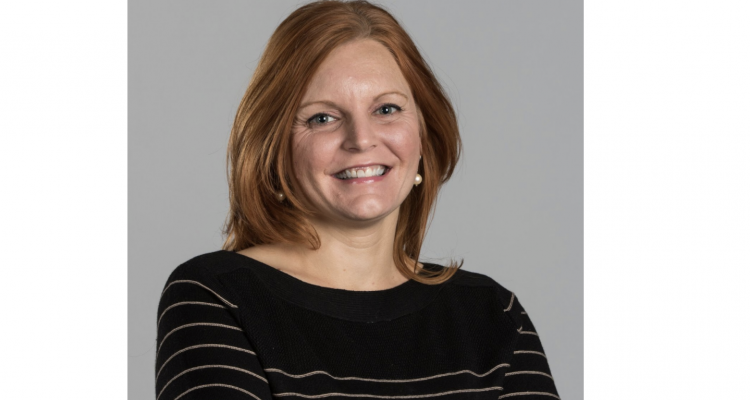In addition to the many benefits of attending Fairfield University, Stags are fortunate enough to share the campus with a faculty that includes some of the most qualified and renowned experts in their fields. Even with this breadth of talent, it is rare to find a professor with as much first-hand experience as assistant professor of politics and public administration, Gayle Alberda, Ph.D.
Prior to joining Fairfield in 2016, Alberda was fully immersed in the political arena, holding various positions in lobbying and campaign strategy within the Republican party. Notably, Alberda served as the GOP’s deputy political director for the Great Lakes Region, overseeing much of its operations. Not surprisingly, this wealth of experience, along with lessons gained from her personal journey, has a tremendous influence on Alberda’s approach to teaching.
“I approach it from two different perspectives. The first being as a first generation college student myself and knowing that I had no guidance or help,” Alberda notes. “That can be overwhelming. Coupled with the experiences I’ve had, I showcase real-world scenarios and how that correlates with political theory.”
For example, Alberda doesn’t just teach students about our election laws; she provides a broader context by explaining their impact on the upcoming 2020 election. She does so with the goal of empowering students to become more knowledgeable scholars and inspired change-makers who are equipped with the tools needed to address many of the issues we face today.
“I try to give students an understanding of the skills they do possess that will be transferable no matter what. In the classroom, I discuss my experiences, both positive and negative, to create a sense of comfort and security, where students can harness their potential and engage in meaningful dialogue,” says Alberda.
Alberda can be found teaching a variety of classes at Fairfield, from introductory politics courses to more advanced seminars. On occasion, Alberda will design a course, such as this semester’s “Campaigns & Elections” which draws upon her vast political experience to help students analyze how political campaigns achieve fundamental democratic ideals, while allowing students to formulate their own opinions about how they could be improved.
Alberda’s contributions to the Fairfield campus extend well beyond the walls of her classroom. She also serves as the deputy director of Fairfield University’s Open VISIONS Forum (OVF), which brings world renowned scholars and leaders to campus for discussions regarding the most important contemporary issues. This series is open to the public and often draws large audiences, from students and faculty to local community members. The series brings in acclaimed leaders such as former U.S. Ambassador to the United Nations, Samantha Power and film director, Spike Lee.
“This series allows students to listen and interact with differing opinions. It challenges students to think and assess their preconceived notions. At its core, this is what a Jesuit university is all about; not only preparing students for the workforce, but encouraging personal growth both intellectually and spiritually,” Alberda says.
Alberda is also a trusted political analyst for the media, discussing local, state and national politics. She has collaborated with outlets including The New York Times, The Washington Post and Associated Press Radio. Particularly during election season, Alberda can often be found on television discussing specific races, such as the recent special election in Fairfield for the 132nd House seat.
Alberda notes, “one of the beauties of moving from the political arena, where people gravitate toward you because of the title you hold, to academia is that your Ph.D. and the institution you work for really solidifies you. This expertise gives you a right of passage. My previous experience has taught me how to engage with the media, to take complex information and simplify it. So much of working with the media is fostering and maintaining good relationships.”
Alberda also credits the Fairfield University Marketing and Communications Department for supporting faculty with opportunities to showcase their expertise.
Alberda has made significant contributions to academia through her research on political participation. Her dissertation on the intersection between social theory and public policy was awarded the Robert K. Merton Award. More recently, Alberda has been writing a new book, “Voting Early, but Not Locally” discussing how early voting affects voter turnout in local elections.
Alberda comments, “in the 21st Century you have two things that have become in direct conflict with each other, ballot access and ballot integrity. On the one hand, part of voting is ensuring equal access to the ballot. On the flipside, we need the election to be perceived as valid and legitimate, otherwise it threatens the foundations of our democracy.”
Early voting presents an interesting challenge to these ideals. Many states, including Connecticut, have considered adopting early voting in the hopes it will make our democratic process more accessible. However, some legislators have voiced their concerns about potential voter fraud, which would risk deligitamzing our election results. While most of the attention surrounds national elections, Alberda’s project focuses on the impact of early voting on local elections.
“If you look at the way our democracy is set up, 92 percent of all elected officials are local and 90 percent of all our governments are local,” Alberda says. “One of the interesting things I discovered is that early voting doesn’t seem to work in terms of increasing turnout. I find that it actually depresses turnout.”
Alberda aims to finish the book later in the year. In the meantime, she hopes students will continue to be an integral part of the political process.
Consider pausing “Tiger King,” temporarily closing TikTok and picking up one of Alberda’s suggested reads like “Eyewitness to Power” by David Gergen that gives a behind the scenes take on the leadership of presidents from Nixon to Clinton.


Leave a Reply